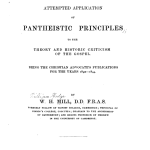Members of the world’s religions disagree on the name for God. I suggest “The Host” as a divine name upon which we can all agree.

In a world of religions divided by theology and terminology, wouldn’t it be nice to agree on something? Renaming God as “The Host” can be a source of mutual conversation. Certainly, every tradition has its unique and distinct titles for the Eternal One. But if we want some commonality, let’s consider adding this one to the list.
Renaming God
Why would we want to rename God? In Renaming God Can Rescue Your Floundering Faith Today, I write:
Unfortunately, God doesn’t work for everyone. What I mean is, that the word “God” doesn’t resonate with many people anymore. Each person who has given up on a traditional Judeo-Christian concept of God has their reasons. Some have suffered emotional abuse and physical violence in God’s name. For others, God is too tied together with patriarchy, or with regional religious conflicts. Many have difficulty imagining a Superman or Santa Claus in the sky. Still others have walked away from the Church and God because Christians have given God a bad name through their political or social stances.
While some who deconstruct their religion abandon God altogether, others are not prepared to embrace atheism. Though they question inherited Sunday school theology, they just can’t shake the idea or feeling of a higher power. They wish they could relate to God, but that word has too much baggage.
By renaming God, we refresh our relationship with the Absolute Being. We come to new understandings that make for a more vibrant spirituality. And we develop unique ways of describing Deity to others.
The Host
In this series, “Renaming God,” we consider new ways of relating to the Divine. Today, I suggest a novel name for God: The Host. This word has three relevant meanings, each of which explores a different aspect of Ultimate Reality. We will discover that polytheists, monotheists, and nontheists can agree on the word “Host” as a term for the Infinite.
A Name for Polytheists, Etc.
The word “host” means “a great company of individuals.” The Hebrew Bible uses “Elohim” over 2,500 times. A singular plural, this word gives translators a challenge. Sometimes the word is translated as “God,” and other times as “gods.” The best way to wrap your head around this is to understand that Judaism is a religion that arose out of polytheism. Contrary to the way it appears in the Abrahamic narrative, the Hebrew understanding of God didn’t arrive at monotheism overnight. Shadows of polytheism remain embedded in the Hebrew text.
Elohim
Genesis 1:1 says that Elohim created the heavens and earth. This gets translated as “God.” Then, in verse 26, Elohim (still translated in the singular) says, “Let us make humans in our image.” Suddenly, we see that a singular God has a plurality about them. Christians often superimpose a trinitarian explanation, but this was far from the concept of the original writers. Most rabbis explain that these verses, and many others that employ “Elohim” refer to the Divine Council, or Heavenly Host.
Henotheism
The notion of multiple gods in the Bible doesn’t sit well with monotheists. They don’t understand that much of the Bible is not, in fact, monotheistic. Instead, henotheism seems pretty normative within Scripture. This is the belief that, while there are in fact multiple gods, Jehovah is the primary one, and the one we worship.
An example is found in Psalm 82:1, which says, “God [Elohim, translated in the singular] has taken his place in the divine council; in the midst of the gods [Elohim, translated in the plural] he holds judgment.” While many interpret this psalm as an indictment against earthly rulers, a better understanding is God’s condemnation of the members of the heavenly council for their failure to judge rightly.
Scriptural Examples of Henotheism
Whether monotheists like it or not, there are many examples of the scriptural references to the existence of a divine council, other gods, or sons of God. A few other examples include:
-
- Genesis 6:2 – a reference to the “sons of God [bene Elohim],” who may have been worshipped as gods at one time.
- Deuteronomy 32:8 – suggesting that the Most High apportioned the nations to the various gods who governed their regions.
- Job 1:6 – where the sons of God [bene ha Elohim], often translated as “heavenly beings” came to present themselves before YHWH, and the accuser [ha satan] came with them.
- 1 Kings 22:19-23 – in which God asks the heavenly host how to entice Ahab to war, and one steps forward, offering to become a lying spirit to perform the task.
- Psalm 89:5-7 – which refers to the “assembly of the holy ones” or “heavenly beings,” who dwell “in the skies.” In these verses, YHWH is to be feared among his peers.
Other examples of henotheism exist in scripture. These are just a few, to give you the flavor. While some theologians suggest that these verses describe angels, their context indicates a Hebrew God exalted among divine peers.
The Heavenly Host
The term “host” can also refer to God’s armies. See examples in Psalm 148:2; Psalm 103:21; Nehemiah 9:6; Luke 2:13. In this context, the word “host” means angels, rather than gods. Thus, God in the singular is “Lord of Hosts,” or “Lord of heaven’s armies.”
Those Who Prefer a Multiplicity
For all these reasons, I suggest the term “Host” as a new name for God. Being a singular plural, it fits the mold of the Hebrew word Elohim. Whether someone is a polytheist, a henotheist, a kathenotheist, a trinitarian, or simply someone who believes in and focuses on angels more than one divine Being, the word “Host” seems to fit.
A Name for Monotheists
So far, we have looked at one definition for the word “host,” meaning a great company of individuals. But this term is multifaceted. Not only is it a singular-plural in one usage; it is also a singular noun in another form, meaning the benefactor of a feast. This is good news for monotheists.
Scriptural Examples
Here are just a few scriptural examples of God depicted as the benefactor of a feast.
-
- Isaiah 25:6 – “On this mountain the Lord of hosts will make for all peoples a feast of rich food, a feast of well-aged wines, of rich food filled with marrow, of well-aged wines strained clear.”
- Luke 14:16-24 – “Then Jesus said to him, “Someone gave a great dinner and invited many. At the time for the dinner, he sent his slave to say to those who had been invited, ‘Come, for everything is ready now.’ But they all alike began to make excuses. The first said to him, ‘I have bought a piece of land, and I must go out and see it; please accept my regrets.’ Another said, ‘I have bought five yoke of oxen, and I am going to try them out; please accept my regrets.’ Another said, ‘I have just been married, and therefore I cannot come.’ So the slave returned and reported this to his master. Then the owner of the house became angry and said to his slave, ‘Go out at once into the streets and lanes of the town and bring in the poor, the crippled, the blind, and the lame.’ And the slave said, ‘Sir, what you ordered has been done, and there is still room.’ Then the master said to the slave, ‘Go out into the roads and lanes, and compel people to come in, so that my house may be filled. For I tell you, none of those who were invited will taste my dinner.’ ”
- Revelation 19:7-9 – “Let us rejoice and exult and give him the glory, for the marriage of the Lamb has come, and his bride has made herself ready; to her it has been ranted to be clothed with fine linen, bright and pure”— for the fine linen is the righteous deeds of the saints. And the angel said to me, “Write this: Blessed are those who are invited to the marriage supper of the Lamb.” And he said to me, “These are true words of God.”
God as The Host
Each of these examples depicts God as the singular, monotheistic, benefactor of a heavenly feast. As the celestial Host, God fulfills all the roles you might expect from a human host. God invites the faithful to share in divine bounty, whether that be earthly prosperity, emotional security, physical health, or any other blessing. God provides existential nourishment for the entire universe. In traditional Near Eastern fashion, God washes the feet of those invited to partake, representing cleansing of sin, guilt, shame, and other spiritual contagion. God offers fellowship to those who dine at the heavenly table. As the Host, God invites us all into meaningful conversation. And God replenishes all whose spiritual cups run dry.
A New Divine Name
The Bible frequently uses the image of a host to describe God. Yet, rarely do you hear God called “The Host” in any meaningful way. Why is this? Perhaps because we then must accept the truth of God’s radical and infinite hospitality. God invites all to the table and turns no one away. When we start to use this name for God, we begin to understand the gospel of extreme inclusion.
“The Host” should be a name for God favored by traditional monotheists, because of its singular nature. Throughout the Bible, whenever the word “host” is used, or whenever the concept is applied to God, we find it in the singular. There is one feast for all the world, one table, and one host.* It is this One who goes to prepare a place for you.
A Name for Nontheists
If polytheists, henotheists, kathenotheists, trinitarians, and angelologists can adopt “The Host” as a name for God, and monotheists employ this appellation as well, then there is one more group of believers who can embrace this name: Nontheists. Yes, you read that correctly—I didn’t say “atheists;” I said “nontheists.” Nontheists represent a collection of people who believe in a Higher Power, without assigning personal attributes to that Power. Examples of various types of nontheism include some forms of Taoism, Buddhism, agnosticism, pantheism, pandeism, and those who are “spiritual but not religious.” Nontheism is a catch-all term for those who believe in some sort of divine universal life force that is nonanthropomorphic in nature.
A Living Organism
Nontheists can embrace the word “Host” in the word’s sense of being the source of life upon which other life forms live and feed. As a living organism that plays host to other client organisms, this disembodied Host is the Living One “in whom we live and move and have our being.”
The Bread of Life
Before Christians balk at this concept of a nonanthropomorphic divine Host, they should recall the Eucharist. As the personal Host at his last super, Jesus offered bread to his disciples. In commemoration of this event every Sunday, Christians partake of a wafer called The Host, which Jesus said is his body and therefore divine. Through this holy communion, Christians feed on divine life.
Jesus said, “For the bread of God is that which comes down from heaven and gives life to the world.” Yes, the bread of life, which is the Host, is the life force of God that fills all living things. When we eat the Host, we partake of that divine Life. Perhaps this Host is the same meta-human universal energy to which so many nontheist faiths refer when they speak of something like “Life with a capital L.”
Why Call God “The Host?”
As I study alternative names for God, I discover many beautiful appellations for the Divine. Some are employed by other religions and others by members of the same faith who embrace creative terminology. While I have encountered many traditions that compare God to a host, I have found none that specifically refer to God as “The Host,” as a divine name. Indeed, this is a name for God that I have come to on my own.
I suggest that “The Host” may rank right up there with some of the better names for God, as its multifaceted meanings represent distinct aspects of the divine nature. Due to its varying significance, this name is one that people of all faiths can use.
Whether they are polytheist, monotheist, or nontheist, people of faith can refer to the God of their Understanding by this name. The Heavenly Host is a great company of celestial individuals. Yet, God is also the singular proprietor of a define feast to which we are all invited. And, God is indeed the Feast itself, the divine Body on which we life and from which we feed. Though various traditions may have different interpretations on the word’s meaning, the title “Host” is a divine name upon which we can all agree.
*Note that the word “host” is a gender-neutral word that can point to a masculine, feminine, or nonbinary Deity.














